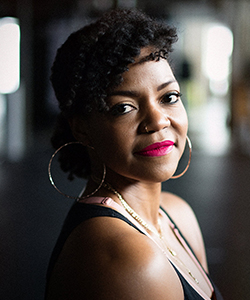We know that obesity can be harmful to our health, but dieting and exercise for the single goal of weight loss can often be disheartening and may even be harmful. Many people labor away at the gym or get caught in crash dieting with their eyes on the scale because the stigma of having a body that others perceive as too large or overweight comes with some nasty stereotypes.

What will it take for the fitness industry – and society – to make fitness more inclusive for both body types and marginalized identities?
On this episode of Curious Campus, UWM’s new podcast about science, discovery and culture, we talk about research and activism around body image and fitness with Christy Greenleaf, a professor of kinesiology in UWM’s College of Health Sciences, and Chrissy King, a certified personal trainer and creator of the Body Liberation Project. Both are members of the Future of Fitness Advisory Board for Self magazine.
Below is a sampling from the program. You can listen to the full show at WUWM.com or on your favorite podcast app.
There are beneficial health effects from losing excess body weight. At the same time, there are these negative effects of weight bias. So how do we sort it out?
Greenleaf: It can be hard to disentangle health improvements of weight loss from engagement in health-supporting behaviors like physical activity and eating in a way that’s nourishing. Because of that, there’s the assumption that if you just lose weight, your health will improve, which may not be the case for everyone. What we do see is that there are consistent health benefits when you become more active, regardless of changes in weight.

We also know that the common coping mechanisms reported by people who experience weight stigma are avoiding physical activity and binge eating. So shaming people will have the opposite effect that we as health professionals would like to see.
What are some downsides of focusing only on weight when exercising? What harm could it do?
King: It sets us up for a harmful relationship with exercise in general – maybe we see it as something that we have to do to control our bodies. And fitness is important for us for so many reasons that have nothing to do with weight loss. It’s great for our emotional or mental health, or better sleep, for energy, for cardio health or stress relief. So when we look at it only as a mechanism for weight loss we forget the joy of moving our bodies in ways that feel good.
Greenleaf: I think human beings have a real need to feel as though they are in control. And the reality is our bodies are not fully in our control. Health is not fully in our control. This notion that I should be able to make my body conform to the societal ideals can also lead to eating disorders.
What are strategies that we should be tapping?

King: When I was working with clients one on one, I was very intentional in not pursuing weight loss as a goal for clients. I think it’s important to set some goals that are not focused on the number on the scale but focus on how I want to feel in my body. Like I want to feel energized. Maybe my goal is to be able to keep up with my kids. Or perhaps I want to be able to run a mile. So focus on how you want to feel in your body.
Greenleaf: Those who operate places where fitness and physical activity happens have the power to influence the kinds of environments that their clients are exposed to. So hiring people of diverse body shapes and sizes can show that anybody can be physically active and knowledgeable in that area. I think that can go a long way toward communicating to clients that physical activity isn’t only available to those with a particular physique.
What is the Body Liberation Project?
King: A lot of us were introduced to the body positivity space, which I think is a wonderful introduction to thinking differently about our bodies. And the idea of body positivity was originally founded by fat Black and brown women.
When you look at mainstream body positivity today, it’s really centered on a lot of thinner white women who are concerned with having some cellulite or a bit more stomach fat than they’d like. And so the Body Liberation Project is about understanding there’s a difference between striving for Euro-centric standard of beauty and living in a marginalized body – a fat body, a queer or trans body, or a Black or brown body that faces systemic oppression as well.







